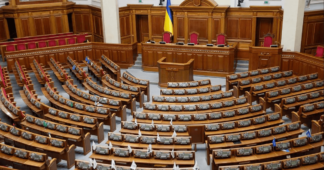By Sandy English
Jul 2, 2022
On June 19, the Ukrainian Verkhovna Rada (parliament) approved by wide margins two reactionary bills that censor Russian literature and musical performances and increase the amount of Ukrainian sung and spoken on the radio. A third law seeks to promote publication of content in the Ukrainian language, which will be used by the Ukrainian national-chauvinists to suppress Russian as a language.
Law 7273-D prohibits the “public performance, display, demonstration,” including music videos, of any Russian citizen. Russian artists are allowed to perform in Ukraine only if they have opposed the invasion of the country, presumably publicly, and are on a supervised, government-managed list.
The passage of the new measures follows in the wake of the widespread acts of censorship by orchestras and classical music competitions around the world to prevent Russian artists—regardless of their political views—from performing.
The list of such actions includes the banning of conductor Tugan Sokhiev by the New York Philharmonic; the cancellation of performances by pianist Alexander Malofeev in Vancouver and Montreal in March; and the firing of Russian conductor Valery Gergiev from the Munich Philharmonic Orchestra. The list of shame also includes the decision of the Sibelius Violin Competition to expel Russian competitors in April, and the banning of Alexander Boldachev from the Dutch Harp Festival in May.
Popular music performers have also been caught up in the anti-Russian campaign such as Russian DJ and performer Nina Kraviz, excluded from the Movement Music Festival in Detroit, the Crave in The Hague, the Netherlands and PollerWiesen in Dortmund, Germany.
The mainstream media in the West has largely expressed approval of the draconian Ukrainian censorship, whose implementation nearly anywhere else in the world would provoke cries of outrage. The BBC, for example, noted that Law 7273-D would supposedly “minimise the risks of possible hostile propaganda through music in Ukraine and will increase the volume of national music products in the cultural space.”
Another part of the new law seeks to increase the amount of Ukrainian on the airwaves. Forty percent of the songs and 75 percent of the daily volume of news, analysis and entertainment programming on the radio must be in Ukrainian. This is an increase from the quotas made in a 2016 law.
A 2019 law had already made Ukrainian the only official “state language.” Nearly one third of the population of Ukraine speaks Russian as a first language and there are minorities speaking Bulgarian, Hungarian, Polish, Romanian, Tartar and Karaite, as well as other languages.
If Russian culture in the spoken word must go, so must Russian on the printed page. Law 7459 bans the “import and distribution in Ukraine of publishing products” from the Russian Federation and forbids printed material “issued in the language of the aggressor state” (i.e., Russian) from being imported from other countries. The German media reports that some Russian classics are to be exempted from the ban, including works by Tolstoy and Pushkin. Also reported, unsurprisingly, has been opposition to the ban from readers in Ukraine.
The crackdown is a continuation of the attempt by the Ukrainian regime at “ethno-cultural cleansing” of Russian literature, of any period or political persuasion. This effort includes the proposals by and actions of the Ukrainian Book Institute (UBI), a division of the Ministry of Culture. A spokesperson for the UBI recently called works by authors such as Pushkin and Dostoyevsky “really very harmful literature” and suggested they be removed from public and school libraries.
Deutsche Welle reports that a Ukrainian “Education Ministry working group has already advised striking some 40 Russian or Soviet authors and poets—among them Leo Tolstoy, Alexander Pushkin, Fyodor Dostoyevsky and Michail [sic] Bulgakov—from school curricula.”
Law 7459 is complemented by Law 6287 which seeks the development “of the Ukrainian book market as an important factor in … national security.” The law provides subsides for bookstores that do not sell Russian books and provides citizens with certificates to purchase Ukrainian books.
The Ukrainian Minister of Culture, Oleksandr Tkachenko, welcomed the restrictions, saying, “The laws are designed to help Ukrainian authors share quality content with the widest possible audience, which after the Russian invasion do not accept any Russian creative product on a physical level.”
The laws must be signed by President Volodymyr Zelensky, who is expected to do so.
These actions are further proof that the United States and NATO are not defending a democratic regime but a chauvinist and nationalist one that resorts to every measure to suppress non-Ukrainian “identity.”
While the Russian invasion is reactionary, it is being used by the Ukrainian far right, which dominates the Ukrainian government, to accelerate the program of ethnic exclusivism that it has hungered after for decades. It is a part of the increasingly anti-democratic measures taken by the regime recently. Earlier this month, a Ukrainian court upheld the banning by Zelensky of 11 opposition parties, including the largest, the Opposition Platform—For Life party.
The escalating of the US-NATO proxy war against Russia has been accompanied by an all-out assault on democratic rights in the imperialist countries as well. In the United States, the dismantling of abortion laws and the degradation of the separation of church and state by rulings of the Supreme Court are high watermarks in this reactionary wave. For months now the far right in the Republican Party has been attempting to remove books and films from school libraries that deal with issues of race and sexuality. All of these acts should be understood in a global context in which capitalism is not only incompatible with democracy, but with even the minimally free development of culture.
We remind our readers that publication of articles on our site does not mean that we agree with what is written. Our policy is to publish anything which we consider of interest, so as to assist our readers in forming their opinions. Sometimes we even publish articles with which we totally disagree, since we believe it is important for our readers to be informed on as wide a spectrum of views as possible.











